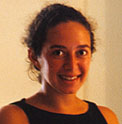 |
||||
| |
Valentina PagliaiLinguistic Anthropology
Active Research
Racial Formation Processes in Everyday Interaction in Italy Since 2005 I have been conducting research in Tuscany, on racial formation processes in everyday interaction, and on the emergence of racialized discourses about immigrants. The research has been funded through a Wenner Gren Fellowship for Anthropological Research, a grant from the National Science Foundation and a Powers Travel Grant from Oberlin College. Below is a summary of the original project: This research analyzes Italian attitudes toward immigrants from outside the European Community and the racialization of self and other to which they are connected. Based on a linguistic anthropological understanding of the importance of language and communication in society, the study considers how race and racism emerge in everyday interactions. The researcher intends to uncover how people may reach an agreement around racist beliefs and stereotypes of themselves and others. In addition, the study pays attention to those cases in which agreement is not reached, and individuals are able to effectively oppose racist narratives. This research is being carried out in Tuscany and uses a series of methodologies available to anthropologists, including videorecording of everyday conversations among groups of people, ethnographic fieldnotes, participant observation, and interviews. The research is cross-disciplinary, bringing together perspectives from linguistics anthropology, European studies and critical race studies. It integrates present work on language and racism, furthering our understanding of how individuals use language in their everyday encounters to form racialized identities, and highlighting the importance of narratives in making sense of our world. In addition, while many current studies on language and racism focus on the experience of the discriminated minorities, this research integrates such studies by focusing on the majority and how they come to see themselves as majority. The ultimate goal of this project is to devise more effective means to oppose discrimination and to foster the integration of immigrants in their countries of arrival. As part of a collaboration with the Antidiscrimination Center of the Province of Pistoia, the Social Observatory of the Province of Pistoia, and the Social Observatory of the Province of Prato, the results will be made public locally and should be used in programs to fight racism. An extended version of the research proposal is available here. I am currently doing the last part of the fieldwork and I am starting to analyze the data gathered. I have two first articles based on this research in preparation. The first, entitled
Conversational agreement and racial formation processes, I just submitted for review to language in Society. Here is the summary: The second, still being written, focuses on alignment and non-alignment in conversation, and their role in racialization.
Verbal Duels Project I find verbal duels and ritual insults to be one of the most intriguing forms of performance. I have been working on a Tuscan genre of verbal duels, called Contrasto, for the past fourteen years. Out of this research I wrote my PhD dissertation, and I am currently finishing a book. The temporary title is Thorny Rhymes: Poetry, Politics and Verbal Duels in Tuscany. The book is now being revised and will be reviewed by Mouton de Gruyter. The book starts with a question: what is so disturbing about the Contrasto, that it had to be obliterated from Italian scholarship, and its artists oppressed by the various Italian governments which have succeeded each other over the last two centuries? I first look for an answer in the characteristics of the genre itself and in its alternative aesthetic system. The Contrasto symbolically and in action opposes hegemony by raising political consciousness among its audience through its texts, and by symbolically negating the primacy of national art and national standard language. Since its creation in the nineteenth century, the Italian nation-state constructed an ideal of national art, with artists seen as embodying the image of the prototypical national citizen. Intellectuals, folklorists and other scholars contributed actively to the creation of this image. This ideal of art silences and excludes genres like the Contrasto, which present an aesthetic system and a sense of self subversive of nationalist ideals. It is in the cracks of power that the Contrasto exerts its pressure, making evident the realities of the varied array of Italian languages and claiming their validity for artistic expression, revealing the multiplicity of politicized identities where state power attempts to create the illusion of a unified and apolitical Italian one. Unfortunately, little has been published on verbal duels and arguments in the past two decades. My book intends to fill that void at least in part, and it will present a cross-section of verbal duels' traditions across the globe. In the future, I intend to edit a volume on Argumentative Discourse and Verbal Duels. Toward that project I organized a double panel on the topic for the 2007 American Anthropological Assiciation meeting. The panel is now being revised into an edited issue, by the same title, to be submitted to the Journal of Linguistic Anthropology in September 2008. The volume will eventually include original contributions from anthropologists, folklorists, and sociolinguists working on the politics and poetics of arguments, conflictual language, verbal duels and ritual insults. The volume should also include and re-publish some classic works on these arguments. The book will incorporate the latest research in order to bring our understanding of verbal duels fully up to date. Italian American Identities Project I have been interested in Italian Americans since 1994. I first did fieldwork with the Los Angeles Italian American Community in 1994-95 (see my Master Thesis). Since then, I maintained an interest in that community, participating to the Italian American Oral History Project, and later I took care of the web page of the Italian Oral History Institute until 2001. I am not sure when I will have the opportunity, but in the future I would like to expand my research on racial formation processes to the US by looking at the construction of race among Italian Americans. I am particularly interested in seeing their attitudes toward recent immigrants to the US and how a sense of their own immigrant origin may affect them (if it does at all). Research Assistants Over the years I have worked with several wonderful Research Assistants and Teaching Assistants. A owe a lot to each of them: 2007, 2008
2006 Irene D'Agostino
2004, 2005 and 2006
|
Remarque Institute UCLA Department of Anthropology Oberlin College |
© Copyright 2006 Valentina Pagliai. All Rights Reserved. Website Template by Interspire ![]() Last updated 09/15/08
Last updated 09/15/08
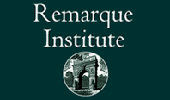



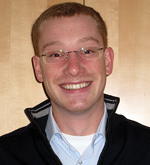 Claudio Guler
Claudio Guler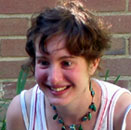 Elia Gilbert
Elia Gilbert Sarvnaz Lotfi
Sarvnaz Lotfi 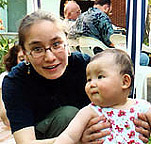 Ashley Suarez
Ashley Suarez 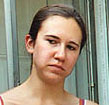 Clare Cira
Clare Cira 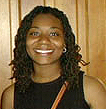 Nedra Lee
Nedra Lee